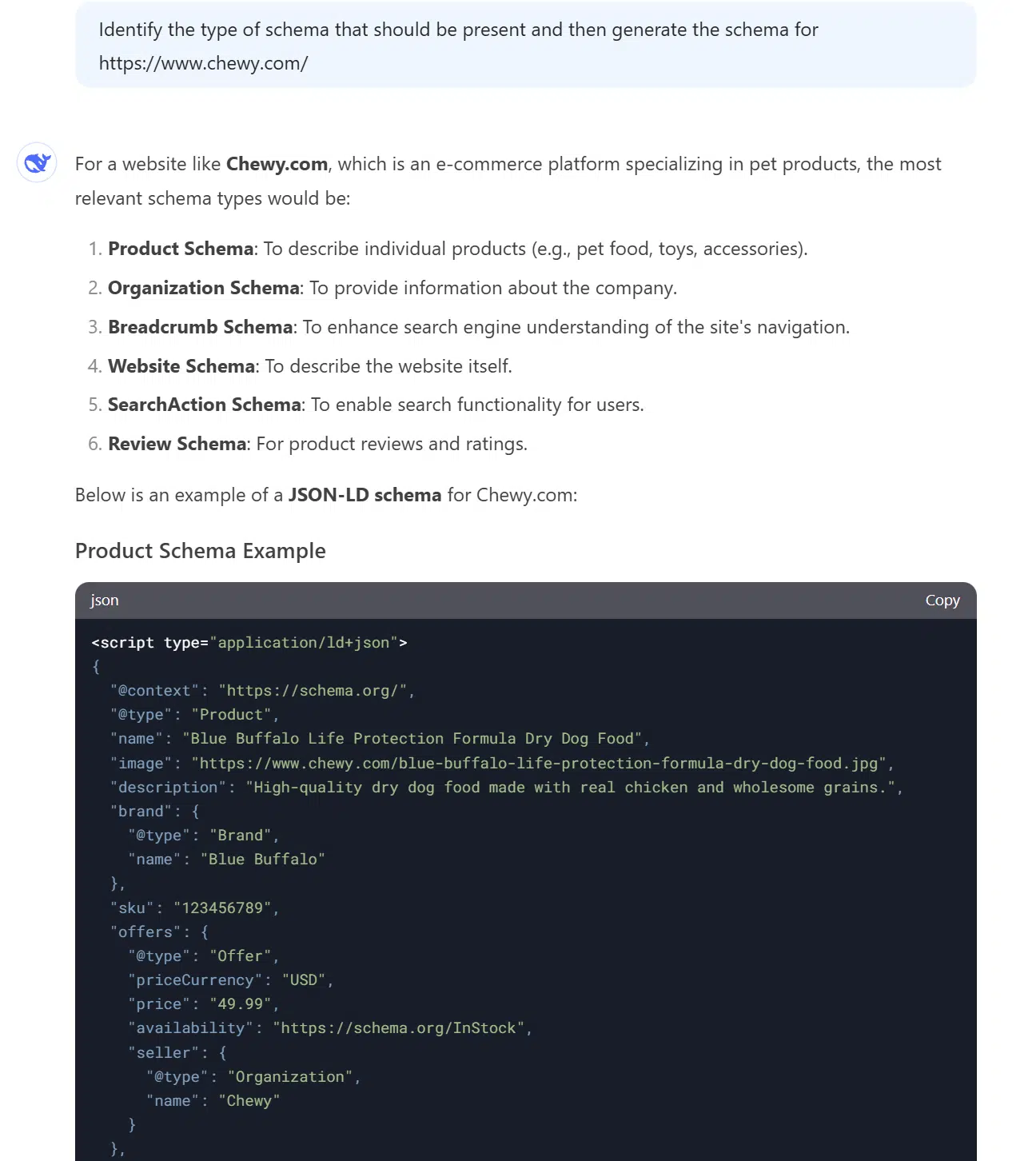DeepSeek & SEO: What you need to know
Curious about DeepSeek? This open-source LLM offers unique advantages for technical SEOs, from coding support to scalable automation.
In the crowded field of AI-powered SEO tools, one open-source large language model (LLM) is quietly gaining traction: DeepSeek.
While giants like Google and OpenAI dominate the LLM landscape, DeepSeek offers a different approach.
Free to use and with a focus on coding and logical reasoning, it presents a unique opportunity for SEOs, particularly those focused on technical optimization.
Is DeepSeek the hidden gem SEOs have been searching for, or are its limitations too significant to ignore? Let’s dive in.
What is DeepSeek?
DeepSeek is an open-source large language model developed by DeepSeek AI, a China-based research lab.
It was launched in late 2023 as part of a growing wave of open-source alternatives to proprietary models like ChatGPT and Gemini.
While still relatively new, DeepSeek has started gaining attention, particularly from developers and technical users, for its strengths in coding, logic-based tasks, and automation.
Several key features define DeepSeek:
- Open-source and customizable: Anyone can access, modify, and self-host the model. For SEOs, this offers the potential for customization, cost savings, and control over data privacy.
- Highly cost-effective: The model is free to use, and self-hosting can reduce reliance on paid APIs from proprietary platforms like OpenAI.
- Resource-efficient: DeepSeek is designed to run efficiently compared to other large models, making it more accessible to those with limited computing resources.
- Some real-time information access: While not as robust as Perplexity, DeepSeek has shown limited capability in pulling more current information, though this is not its primary strength.
- Strong in coding and automation: DeepSeek excels in generating scripts, solving logic-based problems, and assisting with technical SEO tasks – areas where other LLMs may fall short.
These features, however, come with their share of limitations:
- Content and language limitations: DeepSeek generally struggles to produce high-quality content compared to ChatGPT and Gemini. It also lacks strong multimodal support for integrating images or other media into its outputs.
- Lower accuracy: It can return inaccurate or incomplete information, especially for complex, nuanced, or factual queries. This is especially true when dealing with news or misinformation detection. It failed 83% of the time when tested against false narratives, a NewsGuard evaluation found.
- Censorship and bias: The official version of DeepSeek has been found to censor responses to certain politically sensitive topics, particularly those related to China.
- Security concerns: Using DeepSeek’s hosted API involves sending data to servers in China, raising privacy concerns. However, self-hosting the model locally or on a private server removes this risk and gives users full control over security.
- Smaller ecosystem: Compared to ChatGPT or Gemini, DeepSeek has a smaller community and fewer third-party tools, meaning users may need to be more self-sufficient when troubleshooting or building custom applications.

The sample above highlights DeepSeek’s limitations with factual accuracy, revealing that its knowledge cutoff is October 2023.
In short, DeepSeek offers a compelling blend of open-source flexibility, cost-effectiveness, and specialized strengths in coding and automation.
While its limitations in content generation, accuracy, and potential security concerns are undeniable, they shouldn’t overshadow its potential value for technical SEOs.
DeepSeek’s potential for SEO: Where it may have an edge
Most AI tools marketed to SEOs focus on content – drafting articles, rewriting meta descriptions, or summarizing search trends.
But DeepSeek isn’t trying to be a better writer.
It’s built for logic-based tasks, meaning its strengths align more with automation, pattern recognition, and large-scale technical problem-solving.
This makes it a different beast altogether and one that requires a distinct approach.
For SEOs working with thousands of URLs and complex site structures, DeepSeek presents an opportunity to move beyond one-off prompts and into scalable solutions.
Instead of asking an AI how to fix a problem, SEOs could integrate DeepSeek into their workflows to actively detect, diagnose, and even resolve technical SEO challenges at scale.
However, this integration isn’t as simple as clicking a button.
It requires a certain level of technical expertise and a willingness to get your hands dirty with code.
Let’s be clear: DeepSeek integration is not for the non-technical or faint of heart.
That said, DeepSeek can still offer value without full-scale automation.
For SEOs who just need help with schema generation, regex creation, or coding quick fixes, it can act as a technical assistant, often outperforming more general-purpose LLMs like ChatGPT in these areas.
Whether you’re looking for one-off coding support or considering integrating it into a larger system, DeepSeek could be a real asset – but only for those with the right skillset or the resources to partner with developers.
Dig deeper: Can AI perform technical SEO analysis effectively?
DeepSeek as your coding assistant
Even without advanced integration, DeepSeek can be a valuable tool for SEOs who regularly tackle technical tasks.
Its coding capabilities make it well-suited for one-off, ad hoc support – helping SEOs generate clean, functional code without needing deep programming expertise.
For example, you could ask DeepSeek to:
- Write schema markup for a product page based on a few key details.
- Generate a regex pattern to match a set of URL parameters in your log files.
- Draft a Python script to pull data from multiple CSV exports and identify broken internal links.
- Suggest .htaccess rules for redirecting specific URL patterns after a site migration.

The example above highlights the use of DeepSeek to provide guidance and build out schema markup.
While models like ChatGPT can also handle these kinds of prompts, DeepSeek’s strength lies in its logic-based problem-solving and efficiency with code generation.
SEOs frequently struggle with technical issues – like crawl anomalies, parameter handling, or data clean-up – and may find DeepSeek a more reliable partner for these tasks.
It won’t replace a developer, and you’ll still need to review and test any code before deploying it.
Still, for quick technical solutions, DeepSeek can reduce the back-and-forth and help SEOs work more independently on the coding side of their work.
Building beyond prompts
While DeepSeek can be a handy coding assistant for one-off technical tasks, its real power shows up when you stop thinking about prompts and start thinking about systems.
For SEOs managing sprawling ecommerce catalogs, multi-location sites, or enterprise platforms, DeepSeek opens the door to automation at scale.
We’re talking about moving past manual audits and into custom-built tools that process crawl data, analyze patterns, and surface technical SEO issues across thousands of URLs.
This isn’t about asking, “How do I write a redirect rule?” It’s about building something to spot the broken ones for you and adapt to your specific URL structure.
Here’s where DeepSeek could help SEOs not just work faster – but work smarter:
Automated log file analysis
Server logs tell the story of how search engines crawl your site – but reading millions of lines to find crawl waste? No thanks.
DeepSeek could ingest these logs and highlight where Googlebot is burning crawl budget on junk – like search result pages with endless URL parameters.
An international travel booking site could spot this early, adjust their robots.txt, and keep bots focused on the pages that matter.
Pattern recognition for large sites
At scale, small inconsistencies become big SEO problems – duplicate products split across URLs, orphaned categories, or thin content clusters.
DeepSeek could scan URL patterns, internal links, or title tags and flag what doesn’t fit.
Imagine a marketplace platform spotting products listed under both /products/blue-shoes and /product/blue-shoes.
DeepSeek surfaces the issue. The SEO team cleans up the URLs. Authority consolidates. Rankings recover.
Automating schema markup generation
Schema helps you stand out in search, but building JSON-LD for every product or location? Painful.
DeepSeek could turn raw business data into structured schema at scale.
A national fitness franchise could feed in location details and class schedules – DeepSeek generates accurate markup for hundreds of pages, no manual copying and pasting required.
Regex pattern suggestions for audits
Regex is either your best friend or your worst enemy. It’s powerful – but getting it right can feel like solving a riddle in another language.
DeepSeek could write regex based on plain English inputs, making audits faster and cleaner.
An SEO agency working on a large news publisher could automate query pattern detection, catching duplicate versions of articles before they spiral into an indexation nightmare.
Internal linking at scale
Internal linking can boost rankings, but on large content sites, identifying gaps is a needle-in-a-haystack problem.
DeepSeek could scan crawl data and keyword relationships, suggesting internal link opportunities across the site.
A health publisher could automatically surface linking opportunities between evergreen guides and trending new content, strengthening topic clusters without manual digging.
Why this matters
While these tasks can be done manually or even through a series of individual prompts with other LLMs, that approach quickly becomes inefficient – and scaling it through paid APIs can get expensive.
DeepSeek’s open-source nature offers a different path: the potential to automate and scale these processes efficiently and affordably.
This isn’t about replacing human judgment.
It’s about freeing up SEOs to focus on strategy while letting the machine handle the heavy lifting.
But – and this is the recurring theme – it won’t do it out of the box.
You need the technical know-how. You need to build the system.
For those who do, DeepSeek could change how technical SEO work gets done.
So, should SEOs care about DeepSeek?
DeepSeek offers SEOs a unique blend of open-source flexibility, cost-effectiveness, and specialized technical capabilities.
While it’s not a replacement for general-purpose LLMs like ChatGPT or Gemini, its strengths in automation and custom tooling make it an intriguing option for technically inclined SEOs.
DeepSeek isn’t trying to be everything to everyone. It’s carving a niche in the realm of technical SEO, offering a specialized tool for automation, coding, and custom solutions.
The future of DeepSeek is tied to its open-source nature.
Community development will be key to addressing its current limitations, particularly in accuracy and complex reasoning.
SEO-specific tuning could unlock its full potential, transforming it into a high-value asset for technical SEO professionals.
Imagine a DeepSeek model specifically trained on SEO data, capable of generating highly accurate schema markup, analyzing complex log files with ease, or even predicting ranking fluctuations.
The possibilities are intriguing.
So, should SEOs care about DeepSeek?
For those willing to invest the time and resources to understand its nuances and leverage its strengths, the answer is likely yes.
It’s not a plug-and-play solution, and its limitations are real.
Its open-source nature, combined with its specialized technical capabilities, makes it a model worth watching – and perhaps even helping to shape.
However, if you’re searching for the next great content generation LLM? Keep walking.
DeepSeek isn’t that. And it’s not trying to be.
Dig deeper: Technical SEO: Don’t rush the process
Contributing authors are invited to create content for Search Engine Land and are chosen for their expertise and contribution to the search community. Our contributors work under the oversight of the editorial staff and contributions are checked for quality and relevance to our readers. The opinions they express are their own.
Related stories
New on Search Engine Land